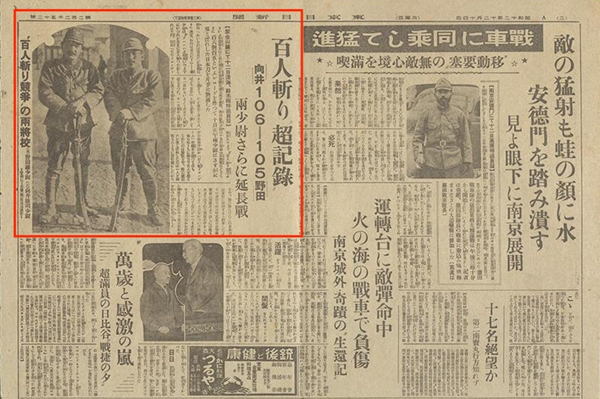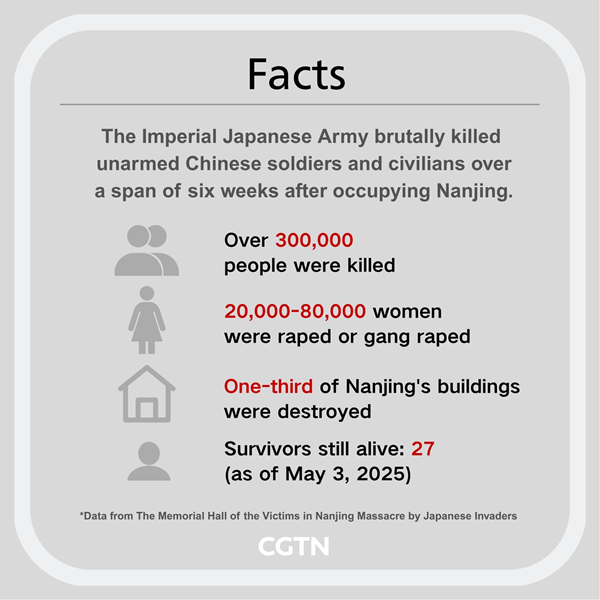'Dead to Rights:' Why we should not forget the Nanjing Massacre
2025-08-07 08:49:00
This summer, the Chinese film "Dead to Rights" topped the box office, sparking a wave of reflection, especially among younger audiences. For many, it was their first time seeing a film about the Nanjing Massacre. They realized that the effects of this trauma continue to influence China's national identity and standing in the world, despite having occurred over 80 years ago.
2025 marks the 80th anniversary of the victories in both the World Anti-Fascist War and the Chinese People's War of Resistance Against Japanese Aggression. On September 3, China will hold a grand military parade to commemorate these milestones. Against this backdrop, "Dead to Rights" takes audiences back to one of the darkest and most overlooked chapters of the war: the Nanjing Massacre.
The film tells the true story of Chinese civilians who risked their lives to preserve photographic evidence of Japanese war crimes during the occupation of Nanjing, defying both military censorship and propaganda. In the movie, a Japanese military officer brings film negatives to a local studio to be developed. While processing the film, the Chinese photo technicians discovered horrifying images of mass executions, rape, and brutality inflicted by the invading troops. They made the courageous decision to copy the images secretly and smuggle them out of the city, hoping that one day the world would bear witness.
From 1931 to 1945, Japan waged a brutal war of aggression across China, committing crimes against humanity in dozens of cities. An estimated 35 million Chinese civilians and soldiers lost their lives. The Nanjing Massacre, which began in December 1937, was one of the worst atrocities of that era: over 300,000 civilians and surrendered soldiers were slaughtered, women raped, children mutilated. The scale of violence was so extreme that, as one critic put it, "if the crimes committed in Nanjing were shown on screen in full, no theater in the world could play the film."
The movie "Dead to Rights,"however, is a masterclass in restraint. It avoids graphic spectacle in favor of quiet moral clarity. Based on real events, the story mirrors that of Luo Jin, an apprentice at a Nanjing photo studio who secretly copied a Japanese officer's film roll, and Wu Xuan, who safeguarded the prints and later used them as legal evidence. These photographs were instrumental in convicting Japanese Lieutenant General Hisao Tani of being a Class-B war criminal during post-war trials.

On December 14, 1937, the Tokyo Nichi Nichi Shimbun (Tokyo Daily News) ran a chilling headline: "Incredible Record: Mukai 106 – 105 Noda – Both 2nd Lieutenants Go Into Extra Innings," glorifying a gruesome killing contest with a photograph taken near Changzhou by Shinju Sato. /Photo provided to CGTN
Images and film have always played a crucial role in preserving historical memory. Alongside the efforts of Chinese civilians, American missionary John Gillespie Magee captured the only surviving video footage of the Nanjing Massacre: grainy black-and-white reels showing mass executions and terrified refugees. In 1946, Magee testified before the International Military Tribunal for the Far East in Tokyo, presenting this footage as damning evidence, helping to condemn war criminals like General Iwane Matsui to eternal disgrace.
Today, courageous acts to uphold historical truth continue. In 2022, American citizen Evan Kail discovered a WWII photo album that included rare images of atrocities committed by Japanese troops in China. Despite receiving threats, Kail donated the album to the Chinese Consulate in Chicago. "Now you have1.4 billion friends in China," the Chinese internet responded with overwhelming gratitude.
Yet even as technology has made information more accessible, collective memories of World War II are quietly eroding. Studies show that many young people in the West cannot name key battles, the Holocaust, locations, or atrocities that took place in World War II – especially in Asia. In some countries, entire chapters on the war in the Pacific Theater have vanished from textbooks. This isn't just ignorance. It reflects the insufficient state of historical education worldwide.

Worse still, some of this amnesia is intentional. Japan, the perpetrator of wartime atrocities, is now attempting to reframe its historical narrative through film and television. Stories of "innocent soldiers" and "suffering families" dominate Japanese pop culture portrayals of the war, cleverly shifting focus from aggression to victimhood. These seemingly apolitical narratives create space for historical whitewashing and even the return of militarist thinking.
The continued visits by Japanese politicians to the Yasukuni Shrine—which honors war criminals guilty of crimes against humanity—send a disturbing signal to the international community. Such actions trivialize the suffering of victims and reduce Japan’s sporadic apologies for its wartime aggression to hollow performances devoid of genuine accountability.
In this global context, "Dead to Rights" is both a response to history and a response to the present. The film is set for release in Australia and New Zealand on August 7, and in the United States and Canada on August 15. Later this year, it will reach global streaming platforms, offering international audiences a long-overdue perspective on the war's Eastern front.
As of May 3, 2025, only 27 registered survivors of the Nanjing Massacre remain alive. This movie, to a certain extent, makes up for this loss. It allows audiences to experience the terrifying scenes that the survivors once endured through compelling imagery.
To remember the war is not to sow hatred. China has long opposed war on any nation. What it seeks to remember is not nationalist triumph, but shared human suffering. One line from the film has stayed with many viewers: "Photographs may fade, but history does not."
Forgetting isn't just erasure. It's a second massacre – to Nanjing, and to truth itself.
(Min Rui is a culture journalist and a special commentator for CGTN.)